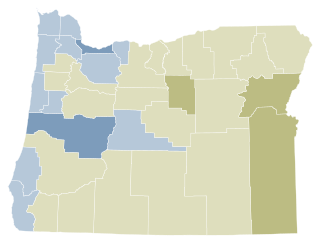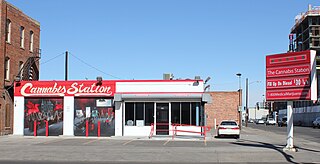
Proposition 215, or the Compassionate Use Act of 1996, is a California law permitting the use of medical cannabis despite marijuana's lack of the normal Food and Drug Administration testing for safety and efficacy. It was enacted, on November 5, 1996, by means of the initiative process, and passed with 5,382,915 (55.6%) votes in favor and 4,301,960 (44.4%) against.

In the United States, the removal of cannabis from Schedule I of the Controlled Substances Act is a proposed legal and administrative change in cannabis-related law at the federal level. It has been proposed repeatedly since 1972. The category is the most tightly restricted category reserved for drugs that have "no currently accepted medical use."

The Oregon Medical Marijuana Act, a law in the U.S. state of Oregon, was established by Oregon Ballot Measure 67 in 1998, passing with 54.6% support. It modified state law to allow the cultivation, possession, and use of marijuana by doctor recommendation for patients with certain medical conditions. The Act does not affect federal law, which still prohibits the cultivation and possession of marijuana.
In United States v. Oakland Cannabis Buyers' Cooperative, 532 U.S. 483 (2001), the United States Supreme Court rejected the common-law medical necessity defense to crimes enacted under the federal Controlled Substances Act of 1970, regardless of their legal status under the laws of states such as California that recognize a medical use for marijuana. Oakland Cannabis Buyers' Cooperative was represented by Gerald Uelmen.
Medical necessity is a legal doctrine in the United States related to activities that may be justified as reasonable, necessary, and/or appropriate based on evidence-based clinical standards of care. In contrast, unnecessary health care lacks such justification.
Oaksterdam is a cultural district on the north end of Downtown Oakland, California, where medical cannabis is available for purchase in cafés, clubs, and patient dispensaries. Oaksterdam is located between downtown proper, the Lakeside, and the financial district. It is roughly bordered by 14th Street on the southwest, Harrison Street on the southeast, 19th Street on the northeast, and Telegraph Avenue on the northwest. The name is a portmanteau of "Oakland" and "Amsterdam," due to the Dutch city's cannabis coffee shops and the drug policy of the Netherlands.
California Senate Bill 420 was a bill introduced by John Vasconcellos of the California State Senate, and subsequently passed by the California State Legislature and signed by Governor Gray Davis in 2003 "pursuant to the powers reserved to the State of California and its people under the Tenth Amendment to the United States Constitution." It clarified the scope and application of California Proposition 215, also known as the Compassionate Use Act of 1996, and established the California medical marijuana program. The bill's title is notable because "420" is a common phrase used in cannabis culture.

In the United States, increased restrictions and labeling of cannabis as a poison began in many states from 1906 onward, and outright prohibitions began in the 1920s. By the mid-1930s cannabis was regulated as a drug in every state, including 35 states that adopted the Uniform State Narcotic Drug Act. The first national regulation was the Marihuana Tax Act of 1937.

Cannabis in Oregon is legal for both medical and recreational use. In recent decades, the U.S. state of Oregon has had a number of legislative, legal, and cultural events surrounding use of cannabis. Oregon was the first state to decriminalize the possession of small amounts of cannabis, and among the first to authorize its use for medical purposes. An attempt to recriminalize possession of small amounts of cannabis was turned down by Oregon voters in 1997.

In the United States, the use of cannabis for medical purposes is legal in 38 states, four out of five permanently inhabited U.S. territories, and the District of Columbia, as of March 2023. Ten other states have more restrictive laws limiting THC content, for the purpose of allowing access to products that are rich in cannabidiol (CBD), a non-psychoactive component of cannabis. There is significant variation in medical cannabis laws from state to state, including how it is produced and distributed, how it can be consumed, and what medical conditions it can be used for.

Cannabis in California has been legal for medical use since 1996, and for recreational use since late 2016. The state of California has been at the forefront of efforts to liberalize cannabis laws in the United States, beginning in 1972 with the nation's first ballot initiative attempting to legalize cannabis. Although it was unsuccessful, California would later become the first state to legalize medical cannabis through the Compassionate Use Act of 1996, which passed with 56% voter approval. In November 2016, California voters approved the Adult Use of Marijuana Act with 57% of the vote, which legalized the recreational use of cannabis.
Several authors have put forth arguments concerning the legality of the war on drugs. In his essay The Drug War and the Constitution, libertarian philosopher Paul Hager makes the case that the War on Drugs in the United States is an illegal form of prohibition, which violates the principles of a limited government embodied in the United States Constitution.
Wo/Men's Alliance for Medical Marijuana (WAMM) is a not-for-profit medicinal cannabis dispensing collective located in Santa Cruz, California. WAMM was founded in 1993 by Valerie Leveroni Corral and her then-husband Michael Corral. Valerie Corral is also the executive director of Raha Kudo: Design for Dying Project, a non-profit corporation that provides education and research to support persons facing death and their caregivers. Members of WAMM receive organic medicinal cannabis at cost while volunteers trade work for cannabis. There is a compassion program for those unable to afford the full cost of medical cannabis. WAMM was the first medical marijuana collective to receive non-profit status from the United States Government.
Gonzales v. Raich, 545 U.S. 1 (2005), was a decision by the U.S. Supreme Court ruling that, under the Commerce Clause of the U.S. Constitution, Congress may criminalize the production and use of homegrown cannabis even if state law allows its use for medicinal purposes.

Conant v. Walters, 309 F.3d 629, is a legal case decided by the United States Court of Appeals for the Ninth Circuit, which affirmed the right of physicians to recommend medical marijuana. The Court of Appeals affirmed the earlier decision of the United States District Court for the Northern District of California, which was filed under the caption Conant v. McCaffrey. Though the case involved chronic patients with untreatable diseases, the decision does not name these conditions as a prerequisite, nor does it limit drugs which may or may not be illegal.

Cannabis dispensaries in the United States or marijuana dispensaries are a local government regulated physical location, typically inside a retail storefront or office building, in which a person can purchase cannabis and cannabis related items for medical or recreational use. First modeled in Amsterdam in the late 1970s where they were innocently called coffee shops, it would take the Americans more than a generation to successfully duplicate the idea of a retail cannabis storefront. Unlike in the Dutch coffee shops, today dispensary customers are prevented from consuming cannabis on the site of a regulated dispensary in all known markets.

The Adult Use of Marijuana Act (AUMA) was a 2016 voter initiative to legalize cannabis in California. The full name is the Control, Regulate and Tax Adult Use of Marijuana Act. The initiative passed with 57% voter approval and became law on November 9, 2016, leading to recreational cannabis sales in California by January 2018.
Robert Raich is an American attorney. He served as legal counsel in the only two medical cannabis cases heard by the United States Supreme Court: United States v. Oakland Cannabis Buyers' Cooperative in 2001 and Gonzales v. Raich in 2005. His spouse at the time, Angel Raich, was a party in the 2005 case. In 1995, he became one of the founders of California Proposition 215, the initiative that created the first medical cannabis framework in the United States. Raich has been an instructor at Oaksterdam University, where he teaches "how to create defenses against possible hostile action by the government" for students of the cannabis industry.








